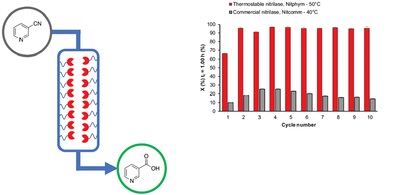Teepakorn C, Zajkoska P, Cwicklinski G, De Berardinis V, Zaparucha A, Nonglaton G and Anxionnaz-Minvielle Z
Biotechnology Journal, 2021, 16 (10)
Abstract
In recent years, many biocatalytic processes have been developed for the production of chemicals and pharmaceuticals. In this context, enzyme immobilization methods have attracted attention for their advantages, such as continuous production and increased stability. Here, enzyme immobilization methods and a collection of nitrilases from biodiversity for the conversion of 3-cyanopyridine to nicotinic acid were screened. Substrate conversion over 10 conversion cycles was monitored to optimize the process. The best immobilization conditions were found with cross-linking using glutaraldehyde to modify the PMMA beads. This method showed good activity over 10 cycles in a batch reactor at 30 and 40°C. Finally, production with a new thermostable nitrilase was examined in a continuous packed bed reactor, showing very high stability of the biocatalytic process at a flow rate of 0.12 ml min–1 and a temperature of 50°C. The complete conversion of 3-cyanopyridine was obtained over 30 days of operation. Future steps will concern reactor scale-up to increase the production rate with reasonable pressure drops.


